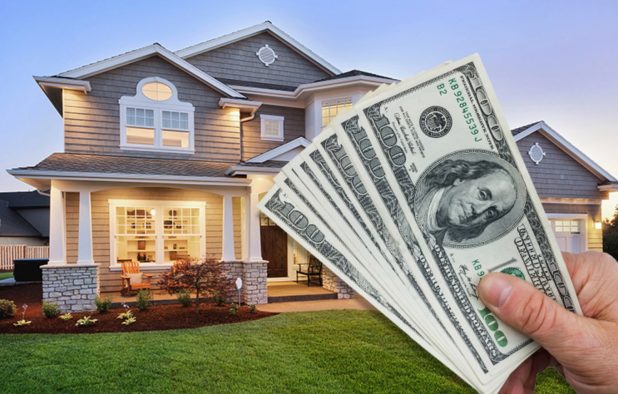It’s something Dave Ramsey has been telling us to do for years, but how many people are actually doing it?
According to the latest CoreLogic numbers, cash sales made up 32.1 percent of home sales in 2016.
Paying cash for a home makes sense for a lot of people, says Michael Newton, CPA and Regional Production Manager of Cornerstone Home Lending, Inc. “Generally, cash buyers are those OK with giving up liquidity in exchange for avoiding a house payment.”
Paying cash for a house: The pros
If you fall within the 32 percent bracket of cash buyers — which HousingWire confirms is the lowest cash sales number we’ve seen in nearly 10 years — you may be a great position. Having cash in today’s market means you could get your dream home before someone else snatches it from under you.
Trulia also notes that getting preapproved for a mortgage can put you in the same league as cash buyers. This cash-in-hand competitive advantage is appealing, but it’s still important to weigh the pros and cons before making a major investment.

Here are some of the biggest advantages of paying for a home in cash:
- Potential for less paperwork. We now know that the 2007-2009 housing crisis was partially the result of looser mortgage lending guidelines. Because of this, the federal government and mortgage lenders have tightened underwriting standards to protect borrowers from another housing bubble. Completing all the steps in a loan process may take anywhere from two weeks to two months, depending on your lender. Cornerstone Home Lending, Inc., offers eligible borrowers a 10-day home loan close, for example. Typical closing time may be extended if you have a complex financial picture, such as being self-employed or recently divorced. If you want to get into a certain home fast, paying cash may cut down on some of the red tape and wait time.
- Investment power. A home can still be a sound investment, factoring in where you buy, what type of house you buy, and what you plan on using it for. If you want to buy a house you can rent out, for example, a cash sale can let you move on to business with little headache. A cash buy is only recommended in this case if you have a strong knowledge of the rental market in your area, confirming your new property is in-demand.
- Possible savings. Buying a home may have extra costs attached to it, no matter how you slice it. These costs include appraisal fees, closing costs, home repairs, and property taxes. But if you can afford to pay with cash, it could skim some extra costs off the top of your purchase. With a cash sale, you won’t have to pay for mortgage expenses like the appraisal fee, closing costs, title insurance, and more. Perhaps the greatest draw of a cash buy is that you won’t be paying loan interest as it grows over time. Purchasing your home at face value means you should get a quicker return on your investment.
Paying cash for a house: The cons
In some cases, paying cash can work against your financial goals. “With the current mortgage rates still near all-time lows, the cost of borrowing at 4 percent or less and the resulting tax write-offs are seen as attractive by most financial advisors,” Newton says.
There are other disadvantages that may apply when paying cash for a house:
- Less liquidity. Being liquid has its advantages. If a buyer can put the money that would have been used to pay for a house to good use, Newton explains, they might be able to yield a return greater than the potential mortgage. “In that situation, it makes sense to not pay cash, and instead, let your money work for you,” he explains. Opportunity costs related to keeping bank and investment balances flush can be drivers to financing versus paying cash.
- Less capital. For others, it’s a question of cash flow. “If you’re newly retired and have limits on the amount of funds you can withdrawal monthly, then keeping the mortgage at a minimum may be a better move,” Newton says. The key is finding that happy medium of a healthy down payment and minimum loan amount that keeps your investments in check, allows your money to grow, and stays in line with your long-term financial goals.
- Potential for overspending. As a cash buyer, bargaining power can be a great thing — and it can also work against you. Cash may get you into your home faster by giving you the upper hand, especially in popular cities with a competitive housing market. But to get in the front door, you could end up spending more than you anticipated. Head-to-head with other cash buyers, you may get locked in a bidding war, requiring you to cough up even more cash to close.
Paying cash for a house: The bottom line
Your mortgage lender can help you answer questions about a cash purchase, but the decision ultimately comes down to your current financial state and what you feel comfortable with. Interestingly, choosing to buy a house in cash may have nothing to do with your income level. The Pennsylvania Association of REALTORS reported for the first quarter of 2017 that older buyers with lower incomes are paying cash in much higher numbers than expected.
Paying cash for a home will give you instant equity, while taking out a mortgage will allow you to get a home and invest your money elsewhere.
For educational purposes only. Please contact your qualified professional for specific guidance.
Sources are deemed reliable but not guaranteed.
Source Article from http://www.hangthebankers.com/when-paying-cash-for-a-home-is-and-isnt-worth-it/
 RSS Feed
RSS Feed















 May 3rd, 2017
May 3rd, 2017  Awake Goy
Awake Goy  Posted in
Posted in  Tags:
Tags: 













